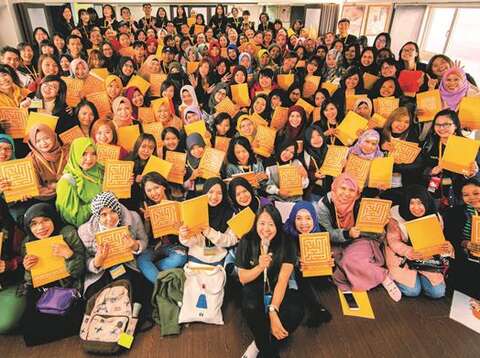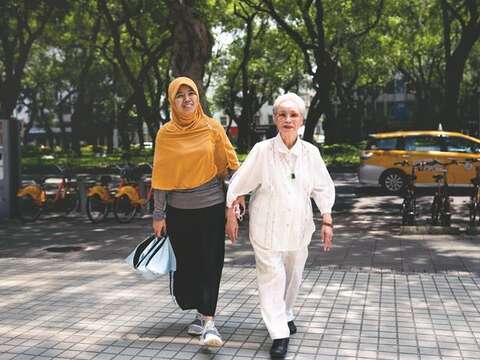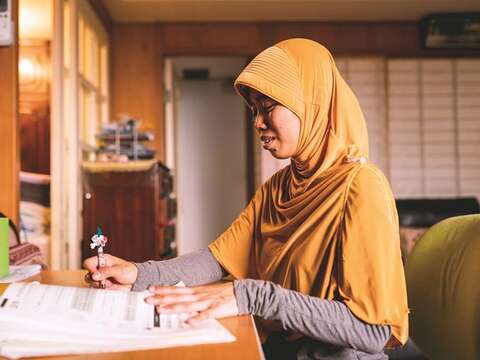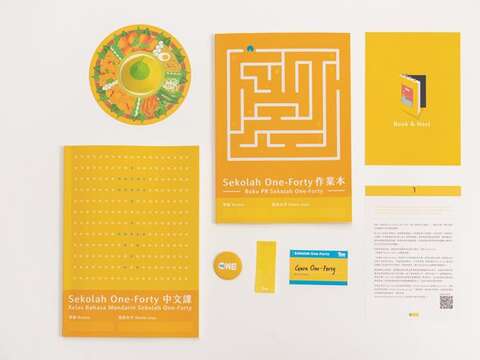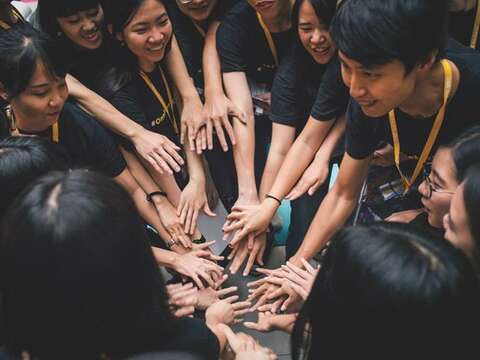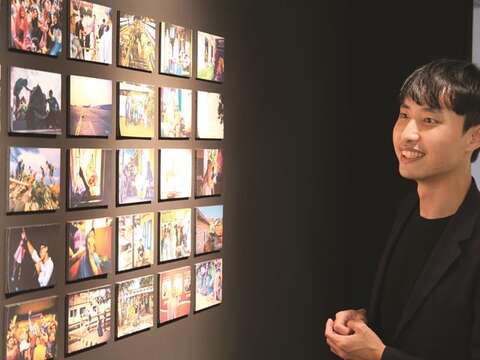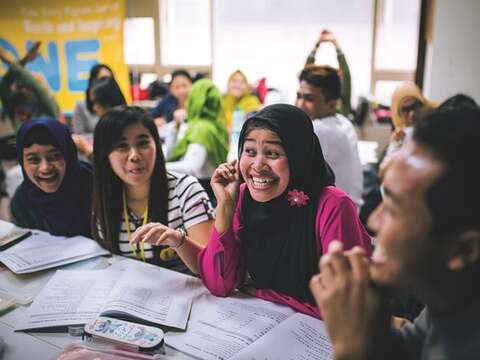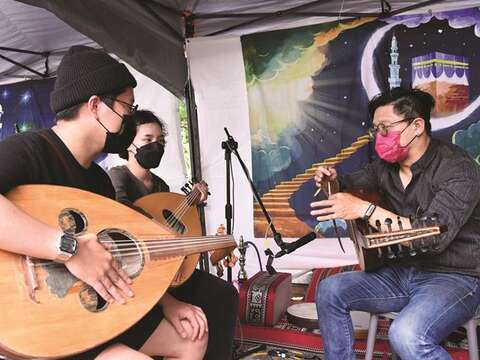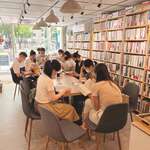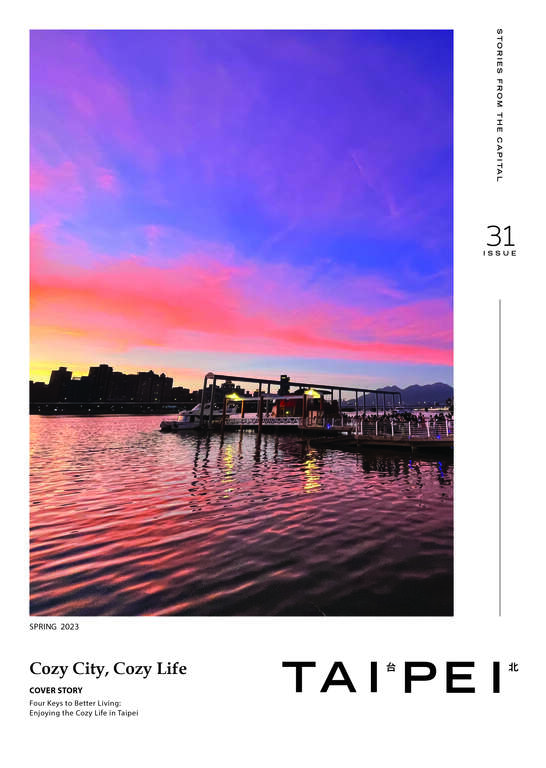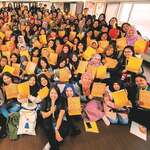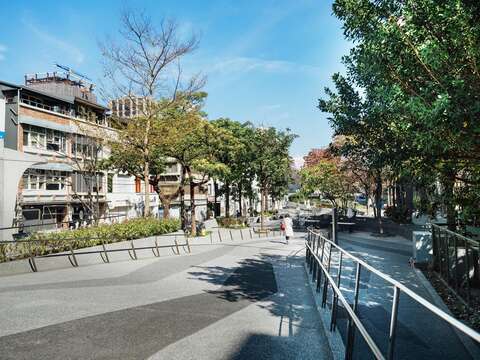Post date:2023-03-13
815
TAIPEI #31 (2023 Spring)
Inclusivity Leading to Win-Win Positivity:
Turning Foreign Labor Into a Talent Resource
Author Rick Charette
Photographer One-Forty, Yuskay Huang, Department of Information and Tourism, Taipei City Government
“The social progress of our society is determined by how we cohabit with people from different countries, as well as from different cultural and linguistic backgrounds.”— Taiwan’s One-Forty NGO
According to the Ministry of the Interior (內政部), migrant workers currently account for more than 70% of the foreign population in Taiwan. Addressing the ever-increasing number of migrant workers here in the city, the Taipei City Government has strengthened its care and counseling measures for these temporary residents.
Complementing these initiatives is One-Forty (社團法人台灣四十分之一移工教育文化協會), a young non-governmental organization that focuses on improving the lives of Taiwan’s migrant workers by providing opportunities for Chinese/Taiwanese language learning, education on the local culture, and improvement of practical life skills, and also engages in public advocacy on their behalf. These individuals are seen not merely as workers, but as professional talent to be nurtured — lifelong “teammates” of Taiwan rather than as short-term hired help.
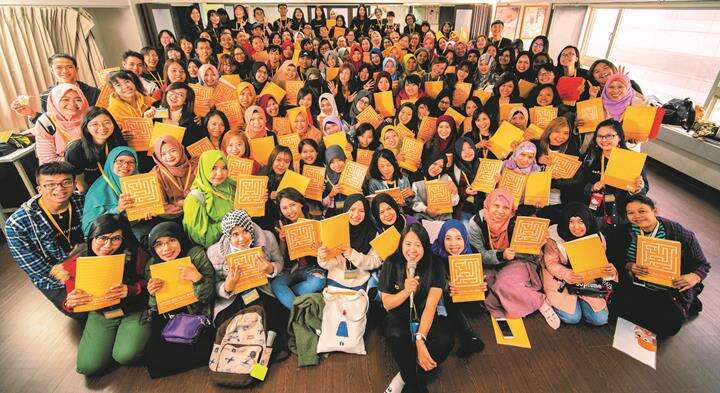 ▲Providing local language education helps migrant workers better adapt to Taipei's culture and environment, while also bringing down barriers between diverse communities.
▲Providing local language education helps migrant workers better adapt to Taipei's culture and environment, while also bringing down barriers between diverse communities.
According to One-Forty’s founder/CEO Kevin Chen (陳凱翔), Taiwan also immediately benefits from such efforts because happy workers with broadened skills tend to stay longer, meaning deeper accumulated work experience and thus even greater value for employers. Workers returning home with positive images of the country also helps the “Taiwan brand” internationally.
Getting to Know Taiwan’s Foreign Laborers
According to data from the Ministry of Labor’s Labor Statistics Inquiry Network (勞動部勞動統計查詢網) and Shiu Yu-han (徐郁涵), Section Chief for the Foreign Worker Counseling Section within the Taipei City Foreign and Disabled Labor Office (台北市勞動力重建運用處), there are currently over 727,000 migrant workers in Taiwan. Approximately 506,000 work in industry (factories, construction, fishing boats), 221,000 as social welfare workers (overwhelmingly as in-home caregivers). “They account for 3.1% of Taiwan’s total population,” says Shiu. In other words, 1 out of every 32 people you come across is a migrant worker. The top three countries of origin are Vietnam, Indonesia, and the Philippines.
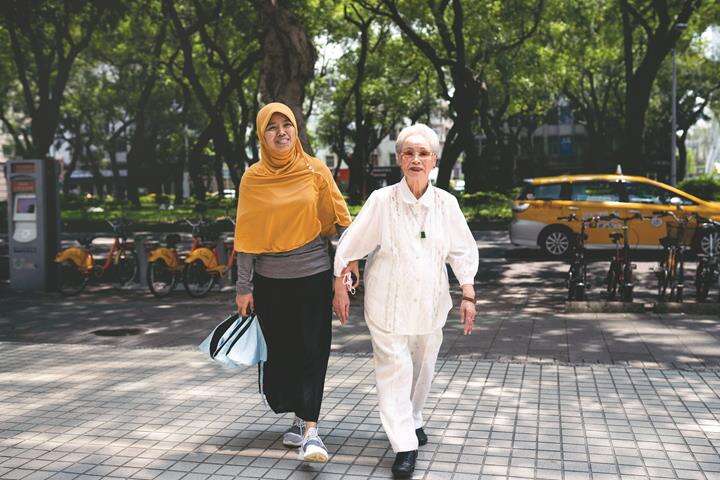 ▲Owing to Taipei’s rapid industrial development, most migrant workers in Taipei work in the long-term care industry.
▲Owing to Taipei’s rapid industrial development, most migrant workers in Taipei work in the long-term care industry.
At the moment, according to Shiu, “Taipei has over 39,000 migrant workers, accounting for 1.6% of the city’s population, with about 2,600 workers employed in industry and 37,000 in social welfare services. In terms of nationality, Indonesians are first, followed by Filipinos and then Vietnamese. In Taipei’s economy the service sector is now dominant and, concomitantly, the majority of our resident migrant workers are caregivers.”
Says One-Forty founder/CEO Kevin Chen, “Almost all migrant workers come for economic opportunities not available back home. Virtually all have high-school education or less. Their stays in Taiwan are generally 8 to 10 years. Most are key economic providers for their families back home — many obliged to leave children and much missing them — sending back much of their earnings and living very frugally here.”
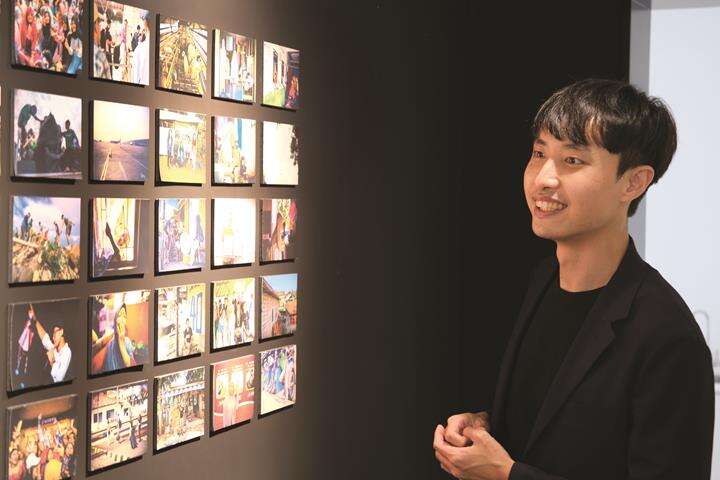 ▲One-Forty founder Kevin Chen introduces events and initiatives he and his colleagues have launched for migrant workers since the founding of the NGO. (Photo/Yuskay Huang)
▲One-Forty founder Kevin Chen introduces events and initiatives he and his colleagues have launched for migrant workers since the founding of the NGO. (Photo/Yuskay Huang)
Care and Counseling Resources Provided by Taipei City
Since some 90% of Taipei’s migrant workers are family caregivers, says Shiu, the city government concentrates its service provision on these individuals. These are focused on two areas: language learning and caretaker skills training.
Language lessons are provided in both Mandarin and Taiwanese. This brings “improvement in the ability to communicate in the caregiver’s Taiwan home, helping to overcome obstacles and avoid misunderstandings,” says Shiu, “and at the same time makes Taiwan life in general more navigable for the worker, facilitating smoother adaptation to the local culture.”
The needs of care recipients vary widely, she adds, so training is provided in a diversified suite of caregiver skills. Migrant workers can apply for one-on-one support, and specialists and interpreters are dispatched to households to teach specific skills in accordance with the needs of the care recipients.
Because resources are limited, fixed quotas are necessary for the city’s counseling services. “Demand is brisk,” Shiu states, “and application limits are quickly filled for all service measures offered. For the Taipei City Government units involved, the implementation rate for these measures is invariably 100%.”
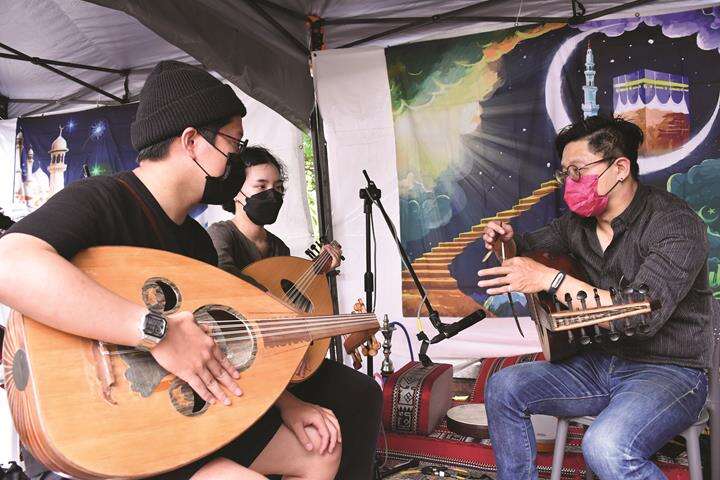 ▲The annual Eid al-Fitr in Taipei provides an activity for people to learn about Islamic culture and experience oud playing. (Photo/Department of Information and Tourism, Taipei City Government)
▲The annual Eid al-Fitr in Taipei provides an activity for people to learn about Islamic culture and experience oud playing. (Photo/Department of Information and Tourism, Taipei City Government)
The city government also organizes special cultural education classes and activities to give Taiwanese citizens windows into the national cultures of the city’s guest workers, closing the gap between the two groups through cultural understanding. An example of this is the annual Eid al-Fitr in Taipei (臺北開齋節歡慶活動) celebrations showcasing Muslim culture, with special attractions such as a halal market, performances by Muslim singers and troupes, cultural-experience booths with such activities as oud playing, and experiencing of Arabic calligraphy.
Story and Mission of the One-Forty NGO
One-Forty was set up in 2015. While in university, Kevin Chen spent time doing volunteer work in the Philippines. He found that relatives of numerous new local friends were migrant workers in Taiwan, and upon his return established acquaintanceships with many of them. Through these two groups, “I learned of the many difficulties migrant workers face,” he says, “and determined that starting up One-Forty was my best way to help.”
And what about the name “One-Forty”? “Pretty straightforward,” he says. “At the time of our founding, the ratio of migrant workers to Taiwan citizens was about one-in-forty. Our hope was that Taiwan citizens would be curious about our unusual title, and this would give us the chance to teach everyone that our migrant workers are everywhere, are your neighbors, are an intrinsic part of everyday life and the Taiwan community.”
The One-Forty motto is “Make Every Migrant’s Journey Worthy and Inspiring.”
Providing Life-Skills Educational Resources
Apart from helping them adapt to life away from home, One-Forty’s desire is to empower Southeast Asian migrant workers by helping them acquire practical knowledge and skills through education. The NGO also seeks to give them the means for becoming financially independent when back home. “We want to help them break out of the vicious cycle of poverty, opening the door to better futures,” Chen adds.
As such, One-Forty has developed Taiwan’s largest learning community for migrant workers. Chen states proudly that, “To date over 73,000 migrant workers have participated in our learning community. We offer physical classes in our education facilities, on such topics as Mandarin Chinese and Taiwanese acquisition, the local Taiwan culture and living environment, and financial planning.” Classes are held on Sundays, generally the only day off for migrant workers.
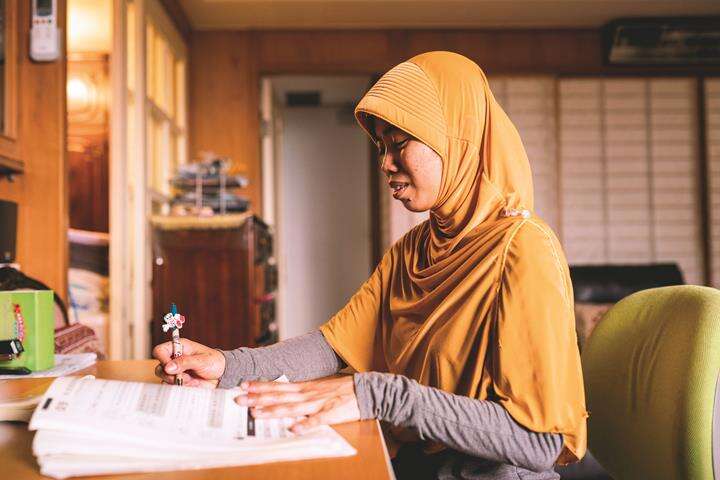
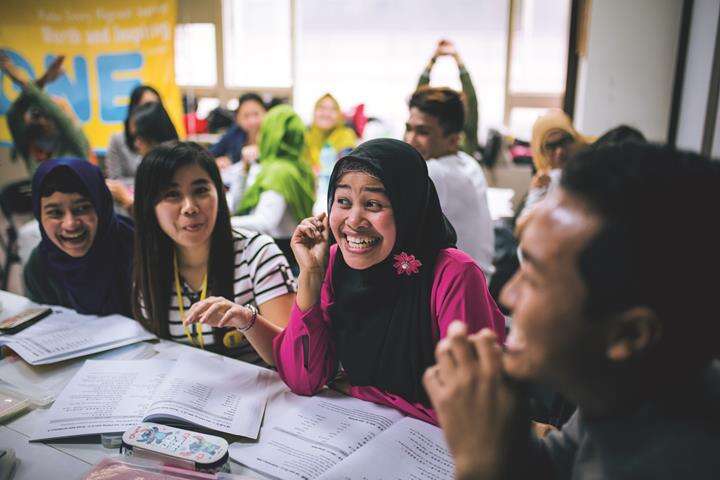 ▲One-Forty not only provides opportunities for migrant workers to further their education, but also assists them in attaining deeper understanding of local culture.
▲One-Forty not only provides opportunities for migrant workers to further their education, but also assists them in attaining deeper understanding of local culture.
“We’ve also developed an online platform for those who cannot physically come to our facilities,” Chen goes on, “creating a YouTube channel, ‘Sekolah One-Forty’, with over 300 native-language videos to date, each five to ten minutes. Each worker can learn at his/ her own pace.”
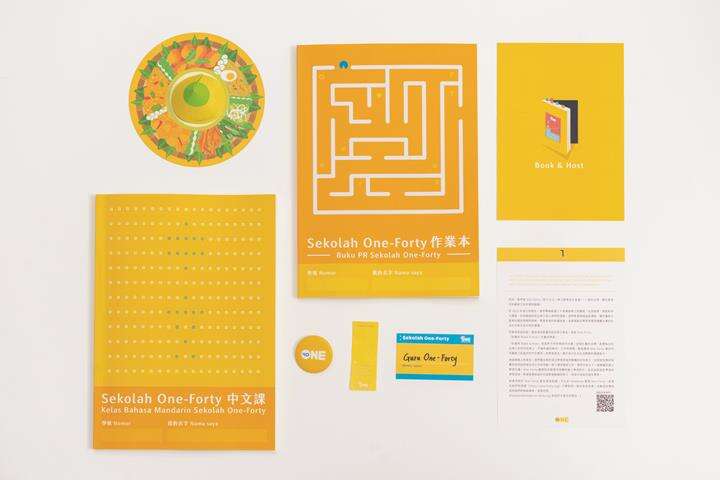 ▲The “Study Partner Learning Kit” developed by One-Forty provides Mandarin learning materials for migrant workers, with the contents including topics connecting to the daily life in Taiwan.
▲The “Study Partner Learning Kit” developed by One-Forty provides Mandarin learning materials for migrant workers, with the contents including topics connecting to the daily life in Taiwan.
One-Forty also provides a one-year distance-learning program for new arrivals in Taiwan, specially designed to help them move quickly from surviving to thriving in the local culture. The “Study Partner Learning Kit (好書伴學習包)” is an innovative resource combining physical textbooks and online supplementary learning, “that concentrates on language learning, understanding of the local culture (including practical matters like taking buses, shopping, doctor visits, etc.), and creating better communication with employers,” says Chen. Workers join a dedicated online learning club — incidentally helping them find new home-country friends — which provides teaching videos and real-time live teaching in their native language.
Engaging in Public Advocacy, Main Obstacles Faced, and Proud Achievements
The greatest obstacle that One-Forty encounters, says Chen, is lingering public stereotypes about migrant workers — dishonesty, laziness, taking jobs from locals, and so on. These have improved greatly over recent years, but much work still needs to be done, and One-Forty believes the best approach is public advocacy, bringing members of the local and migrant worker communities together as “neighbors.”
“The lingering stereotypes lead to distrust on the part of employers,” says Chen, “and to hindered social integration and a sense of loneliness and isolation on the part of workers.” The NGO is engaged in a long-term campaign with a 10-year horizon to slowly break down these prejudices, he goes on, “telling the Taiwanese public the stories of immigrant workers in different ways, including cultural-exchange activities, exhibits, articles, and videos, showing how ‘all dreams are created equal.’ A key time for us each year is the popular Eid al-Fitr in Taipei celebrations, when we stage exchange activities and special exhibits.”
Over 100,000 members of the public have taken part in the NGO’s public advocacy campaign to date. “We’ve also steadily expanded our reach,” Chen says, “and now have 22 cities and counties in our accumulated coverage area.”
 ▲The team at One-Forty is comprised of young people who have a passion for migrant worker issues in Taiwan.
▲The team at One-Forty is comprised of young people who have a passion for migrant worker issues in Taiwan.
Workers returning home have set up a range of different businesses, from salons to restaurants and stores to more unusual ventures. “One returnee set up a shop specializing in pearl milk tea, and another even opened a small sheep farm. We send teams to the various Southeast Asia countries each year, with three basic goals: to find out how returnees are doing, to provide continuing life-skills help where needed, and to canvas returnees to find out how we can further improve our Taiwan services.”
Chen adds that further proof of One-Forty’s strong impact is the fact that more and more Taiwan companies are “contacting us and asking us to set up special programs for their migrant-worker employees (paying a fee to cover costs). More and more of the workers have thus acquired the skills needed to receive promotions as supervisors, junior managers, etc.”
Taiwan’s government and NGO efforts at inclusivity, he states, “is directly leading to win-win positivity for all stakeholders.”
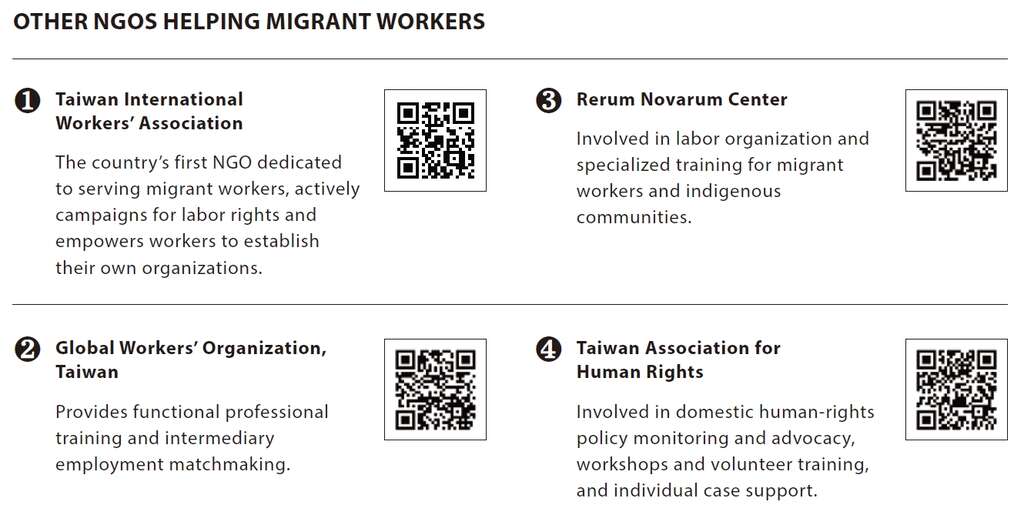
Inclusivity Leading to Win-Win Positivity:
Turning Foreign Labor Into a Talent Resource
Author Rick Charette
Photographer One-Forty, Yuskay Huang, Department of Information and Tourism, Taipei City Government
“The social progress of our society is determined by how we cohabit with people from different countries, as well as from different cultural and linguistic backgrounds.”— Taiwan’s One-Forty NGO
According to the Ministry of the Interior (內政部), migrant workers currently account for more than 70% of the foreign population in Taiwan. Addressing the ever-increasing number of migrant workers here in the city, the Taipei City Government has strengthened its care and counseling measures for these temporary residents.
Complementing these initiatives is One-Forty (社團法人台灣四十分之一移工教育文化協會), a young non-governmental organization that focuses on improving the lives of Taiwan’s migrant workers by providing opportunities for Chinese/Taiwanese language learning, education on the local culture, and improvement of practical life skills, and also engages in public advocacy on their behalf. These individuals are seen not merely as workers, but as professional talent to be nurtured — lifelong “teammates” of Taiwan rather than as short-term hired help.
 ▲Providing local language education helps migrant workers better adapt to Taipei's culture and environment, while also bringing down barriers between diverse communities.
▲Providing local language education helps migrant workers better adapt to Taipei's culture and environment, while also bringing down barriers between diverse communities. According to One-Forty’s founder/CEO Kevin Chen (陳凱翔), Taiwan also immediately benefits from such efforts because happy workers with broadened skills tend to stay longer, meaning deeper accumulated work experience and thus even greater value for employers. Workers returning home with positive images of the country also helps the “Taiwan brand” internationally.
Getting to Know Taiwan’s Foreign Laborers
According to data from the Ministry of Labor’s Labor Statistics Inquiry Network (勞動部勞動統計查詢網) and Shiu Yu-han (徐郁涵), Section Chief for the Foreign Worker Counseling Section within the Taipei City Foreign and Disabled Labor Office (台北市勞動力重建運用處), there are currently over 727,000 migrant workers in Taiwan. Approximately 506,000 work in industry (factories, construction, fishing boats), 221,000 as social welfare workers (overwhelmingly as in-home caregivers). “They account for 3.1% of Taiwan’s total population,” says Shiu. In other words, 1 out of every 32 people you come across is a migrant worker. The top three countries of origin are Vietnam, Indonesia, and the Philippines.
 ▲Owing to Taipei’s rapid industrial development, most migrant workers in Taipei work in the long-term care industry.
▲Owing to Taipei’s rapid industrial development, most migrant workers in Taipei work in the long-term care industry. At the moment, according to Shiu, “Taipei has over 39,000 migrant workers, accounting for 1.6% of the city’s population, with about 2,600 workers employed in industry and 37,000 in social welfare services. In terms of nationality, Indonesians are first, followed by Filipinos and then Vietnamese. In Taipei’s economy the service sector is now dominant and, concomitantly, the majority of our resident migrant workers are caregivers.”
Says One-Forty founder/CEO Kevin Chen, “Almost all migrant workers come for economic opportunities not available back home. Virtually all have high-school education or less. Their stays in Taiwan are generally 8 to 10 years. Most are key economic providers for their families back home — many obliged to leave children and much missing them — sending back much of their earnings and living very frugally here.”
 ▲One-Forty founder Kevin Chen introduces events and initiatives he and his colleagues have launched for migrant workers since the founding of the NGO. (Photo/Yuskay Huang)
▲One-Forty founder Kevin Chen introduces events and initiatives he and his colleagues have launched for migrant workers since the founding of the NGO. (Photo/Yuskay Huang) Care and Counseling Resources Provided by Taipei City
Since some 90% of Taipei’s migrant workers are family caregivers, says Shiu, the city government concentrates its service provision on these individuals. These are focused on two areas: language learning and caretaker skills training.
Language lessons are provided in both Mandarin and Taiwanese. This brings “improvement in the ability to communicate in the caregiver’s Taiwan home, helping to overcome obstacles and avoid misunderstandings,” says Shiu, “and at the same time makes Taiwan life in general more navigable for the worker, facilitating smoother adaptation to the local culture.”
The needs of care recipients vary widely, she adds, so training is provided in a diversified suite of caregiver skills. Migrant workers can apply for one-on-one support, and specialists and interpreters are dispatched to households to teach specific skills in accordance with the needs of the care recipients.
Because resources are limited, fixed quotas are necessary for the city’s counseling services. “Demand is brisk,” Shiu states, “and application limits are quickly filled for all service measures offered. For the Taipei City Government units involved, the implementation rate for these measures is invariably 100%.”
 ▲The annual Eid al-Fitr in Taipei provides an activity for people to learn about Islamic culture and experience oud playing. (Photo/Department of Information and Tourism, Taipei City Government)
▲The annual Eid al-Fitr in Taipei provides an activity for people to learn about Islamic culture and experience oud playing. (Photo/Department of Information and Tourism, Taipei City Government) The city government also organizes special cultural education classes and activities to give Taiwanese citizens windows into the national cultures of the city’s guest workers, closing the gap between the two groups through cultural understanding. An example of this is the annual Eid al-Fitr in Taipei (臺北開齋節歡慶活動) celebrations showcasing Muslim culture, with special attractions such as a halal market, performances by Muslim singers and troupes, cultural-experience booths with such activities as oud playing, and experiencing of Arabic calligraphy.
Story and Mission of the One-Forty NGO
One-Forty was set up in 2015. While in university, Kevin Chen spent time doing volunteer work in the Philippines. He found that relatives of numerous new local friends were migrant workers in Taiwan, and upon his return established acquaintanceships with many of them. Through these two groups, “I learned of the many difficulties migrant workers face,” he says, “and determined that starting up One-Forty was my best way to help.”
And what about the name “One-Forty”? “Pretty straightforward,” he says. “At the time of our founding, the ratio of migrant workers to Taiwan citizens was about one-in-forty. Our hope was that Taiwan citizens would be curious about our unusual title, and this would give us the chance to teach everyone that our migrant workers are everywhere, are your neighbors, are an intrinsic part of everyday life and the Taiwan community.”
The One-Forty motto is “Make Every Migrant’s Journey Worthy and Inspiring.”
Providing Life-Skills Educational Resources
Apart from helping them adapt to life away from home, One-Forty’s desire is to empower Southeast Asian migrant workers by helping them acquire practical knowledge and skills through education. The NGO also seeks to give them the means for becoming financially independent when back home. “We want to help them break out of the vicious cycle of poverty, opening the door to better futures,” Chen adds.
As such, One-Forty has developed Taiwan’s largest learning community for migrant workers. Chen states proudly that, “To date over 73,000 migrant workers have participated in our learning community. We offer physical classes in our education facilities, on such topics as Mandarin Chinese and Taiwanese acquisition, the local Taiwan culture and living environment, and financial planning.” Classes are held on Sundays, generally the only day off for migrant workers.

 ▲One-Forty not only provides opportunities for migrant workers to further their education, but also assists them in attaining deeper understanding of local culture.
▲One-Forty not only provides opportunities for migrant workers to further their education, but also assists them in attaining deeper understanding of local culture. “We’ve also developed an online platform for those who cannot physically come to our facilities,” Chen goes on, “creating a YouTube channel, ‘Sekolah One-Forty’, with over 300 native-language videos to date, each five to ten minutes. Each worker can learn at his/ her own pace.”
 ▲The “Study Partner Learning Kit” developed by One-Forty provides Mandarin learning materials for migrant workers, with the contents including topics connecting to the daily life in Taiwan.
▲The “Study Partner Learning Kit” developed by One-Forty provides Mandarin learning materials for migrant workers, with the contents including topics connecting to the daily life in Taiwan.One-Forty also provides a one-year distance-learning program for new arrivals in Taiwan, specially designed to help them move quickly from surviving to thriving in the local culture. The “Study Partner Learning Kit (好書伴學習包)” is an innovative resource combining physical textbooks and online supplementary learning, “that concentrates on language learning, understanding of the local culture (including practical matters like taking buses, shopping, doctor visits, etc.), and creating better communication with employers,” says Chen. Workers join a dedicated online learning club — incidentally helping them find new home-country friends — which provides teaching videos and real-time live teaching in their native language.
Engaging in Public Advocacy, Main Obstacles Faced, and Proud Achievements
The greatest obstacle that One-Forty encounters, says Chen, is lingering public stereotypes about migrant workers — dishonesty, laziness, taking jobs from locals, and so on. These have improved greatly over recent years, but much work still needs to be done, and One-Forty believes the best approach is public advocacy, bringing members of the local and migrant worker communities together as “neighbors.”
“The lingering stereotypes lead to distrust on the part of employers,” says Chen, “and to hindered social integration and a sense of loneliness and isolation on the part of workers.” The NGO is engaged in a long-term campaign with a 10-year horizon to slowly break down these prejudices, he goes on, “telling the Taiwanese public the stories of immigrant workers in different ways, including cultural-exchange activities, exhibits, articles, and videos, showing how ‘all dreams are created equal.’ A key time for us each year is the popular Eid al-Fitr in Taipei celebrations, when we stage exchange activities and special exhibits.”
Over 100,000 members of the public have taken part in the NGO’s public advocacy campaign to date. “We’ve also steadily expanded our reach,” Chen says, “and now have 22 cities and counties in our accumulated coverage area.”
 ▲The team at One-Forty is comprised of young people who have a passion for migrant worker issues in Taiwan.
▲The team at One-Forty is comprised of young people who have a passion for migrant worker issues in Taiwan.Workers returning home have set up a range of different businesses, from salons to restaurants and stores to more unusual ventures. “One returnee set up a shop specializing in pearl milk tea, and another even opened a small sheep farm. We send teams to the various Southeast Asia countries each year, with three basic goals: to find out how returnees are doing, to provide continuing life-skills help where needed, and to canvas returnees to find out how we can further improve our Taiwan services.”
Chen adds that further proof of One-Forty’s strong impact is the fact that more and more Taiwan companies are “contacting us and asking us to set up special programs for their migrant-worker employees (paying a fee to cover costs). More and more of the workers have thus acquired the skills needed to receive promotions as supervisors, junior managers, etc.”
Taiwan’s government and NGO efforts at inclusivity, he states, “is directly leading to win-win positivity for all stakeholders.”

Gallery
:::
Popular articles
 TAIPEI Quarterly 2023 Spring Vol.31
TAIPEI Quarterly 2023 Spring Vol.31 Four Keys to Better Living: Enjoying the Cozy Life in Taipei (TAIPEI Quarterly 2023 Spring Vol.31)
Four Keys to Better Living: Enjoying the Cozy Life in Taipei (TAIPEI Quarterly 2023 Spring Vol.31) Exploring Taipei’s Cool Modern Architecture (TAIPEI Quarterly 2023 Spring Vol.31)
Exploring Taipei’s Cool Modern Architecture (TAIPEI Quarterly 2023 Spring Vol.31) Finding Your Way Through Reading (TAIPEI Quarterly 2023 Spring Vol.31)
Finding Your Way Through Reading (TAIPEI Quarterly 2023 Spring Vol.31) Inclusivity Leading to Win-Win Positivity: Turning Foreign Labor Into a Talent Resource (TAIPEI Quarterly 2023 Spring Vol.31)
Inclusivity Leading to Win-Win Positivity: Turning Foreign Labor Into a Talent Resource (TAIPEI Quarterly 2023 Spring Vol.31) Historic Landmark Bakeries in Taipei (TAIPEI Quarterly 2023 Spring Vol.31)
Historic Landmark Bakeries in Taipei (TAIPEI Quarterly 2023 Spring Vol.31)
 Inclusivity Leading to Win-Win Positivity: Turning Foreign Labor Into a Talent Resource (TAIPEI Quarterly 2023 Spring Vol.31)
Inclusivity Leading to Win-Win Positivity: Turning Foreign Labor Into a Talent Resource (TAIPEI Quarterly 2023 Spring Vol.31)